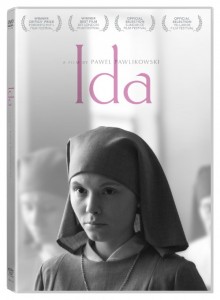It opens with several quiet shots. As a light snow falls,
a group of nuns put up a religious statue, in a gorgeous yet stark and cold
wide shot. We then see the daily routine of the nuns – prayer, eating meals in
silence, and so on. After the setting and feel are established is the young
novice told she must visit her aunt Wanda, a woman whom the orphanage had contacted
but who had never come to claim the girl. And off she ventures into the world.
Wanda (Agata Kulesza) is not at first welcoming when Ida (Agata
Trzebuchowska) shows up at her door, and she asks her, “Are you a Jewish
nun?” Ida is confused, until Wanda tells her, “You’re a Jew,” and
that her last name is Lebenstein. While Wanda reveals some other facts about
Ida’s past, the camera stays on Ida, holding firmly on her as she stares up at
Wanda. It’s an excellent shot. Much of this film is made of static shots, and
so everything is told within the steady frame – by what’s included and what’s
withheld. I love the shots where Wanda is small in the frame, and out of
center. And partly due to the static shots, the film relies heavily on the two
leads, both of whom give remarkable performances.
Ida expresses a desire to visit her parents’ graves. And
so Wanda takes her to the home where her parents lived, in search of a man who
will be able to shed light on how they died and where they’re buried. These
provides for some wonderfully intense scenes. The shadows of World War II are
still strong, but this is not a political film.
Ida walks between two worlds, in some ways belonging
truly to neither. (There’s a harsh moment when she denies any connection to the
Lebensteins to a priest who provides her with shelter for the night.) Wanda
herself has an interesting past; she was a prosecutor in the 1950s, and so
there is likely innocent blood on her hands. What I love is that the film
doesn’t condemn anyone. These are human characters who have made choices and
who continue to make choices. There are no clear lines of right and wrong here,
and that is something that Ida seems to learn about the world outside of the
convent. And when she returns to the convent, it is not in the same spirit or
state with which she left it.
Ida is a film that I know is going to stay with me
for a long time, and one that I plan on watching again soon. It is presented in
Polish with optional subtitles in either English or French.
Special Features
This is a really nice DVD package, including a booklet,
which most releases don’t seem to have anymore. Music Box clearly shows a lot
of care and respect for the film, much in the same way that Criterion is known
to do. The booklet contains two essays, several photos, and short biographies
of the director and two main actors.
The DVD itself has several special features, including a
Q&A with director Pawel Pawlikowski, which was recorded in October of 2013
at the BFI London Film Festival. It is approximately twenty-one minutes, and is
conducted in English. Pawlikowski talks about how the idea of identity is
important to him, and how Wanda was inspired by a person he once knew (that’s a
very interesting anecdote). He also talks about the use of black and white, and
of the framing, the aspect ratio. It’s surprising to learn that the woman who
played Ida never acted before.
On The Set Of Ida is a short piece with interviews
with several key people on the set, including Pawel Pawlikowski, producer Ewa Puszczynska,
director of photography Lukasz Zal, and actors Dawid Ogrodnik and Joanna Kulig.
There is also a seven-minute interview with Pawl
Pawlikowski, in which he talks about rewriting, and the way things change
during the various stages of the film. The special features also include the
film’s theatrical trailer.
Ida was released on DVD on September 23, 2014
through Music Box Films.





No comments:
Post a Comment